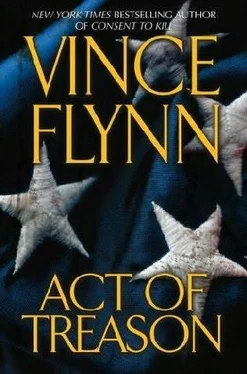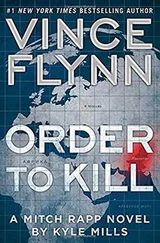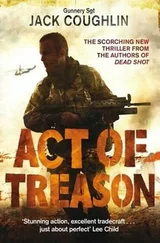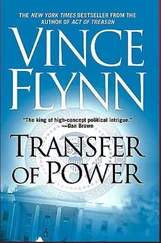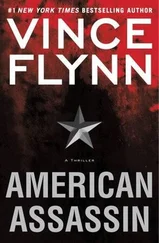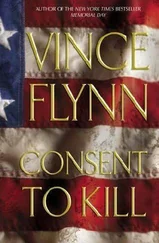“Are you jerking me around? Because if you are, I swear…”
“Easy, killer. You really need to calm down.”
“You should talk.”
“I’m a guy.”
“There you go with the sexist stuff again.”
Rapp glanced at her sideways and decided to ignore the comment. “I found the guy on Cyprus, dragged him back here yesterday, and handed him over to the FBI. They’re going to announce the whole thing at ten o’clock this morning.”
“Does the Secret Service know?”
“I talked to Jack Warch this morning. He knew.”
“Bastards. You think they would have called me.”
“Relax. There’s a chance they only found out this morning.”
Rivera shook her head. “You don’t understand. I don’t exist to them anymore. All I am is a reminder of one of the Service’s greatest failures.”
Rapp supposed she was right. They came up on a small diner, and Rapp grabbed the door and held it for her. They went to a booth near the back, and Rapp practically had to fight Rivera for the side that faced the door. Rapp took off his trench coat and when he sat down he lifted his right arm and checked out the torn seam on his suit coat.
“I’m going to pay for that,” Rivera said.
Rapp ignored her. “So I have a few questions for you.”
“I’m serious about paying for it. Don’t ignore me.”
“Are you always this confrontational, or is this all related to work?”
“I think I used to be a pretty positive person.” She got reflective for a moment. “I was happy with my job. My life was good, although, things were a little barren in the love department, but when we’re in campaign mode there’s no time for anything, and then the damn bomb went off and it’s been pretty shitty ever since then.”
Rapp studied her, slightly surprised by her honesty. Rivera was an extremely attractive woman. She could use a little softening around the edges, but the beauty was undeniable, and it was all natural. She didn’t have to work at a thing. Without any makeup or real sense of style she was an effortless eight. At a place like the Secret Service that would make her a ten, and like all law enforcement agencies the Secret Service had no shortage of puss hounds. If he remembered her file right she was in her mid-thirties. Any woman who was this attractive, and still single at this point in her life, must have some issues.
“You ever wish you had died in the attack?” Rapp knew it was a common reaction from survivors. Especially, survivors whose job it was to protect those who died.
Rivera studied Rapp for a moment and then said, “I thinkwish might be a little strong, but yeah, I’ve thought about it.”
The waitress pulled up to the table and killed the conversation. They both ordered coffee and water, and Rivera ordered the heart-healthy omelet while Rapp asked for the corned beef and hash. When the waitress was gone, Rivera began peppering him with questions about the man in the red hat. Rapp gave her the vanilla version only, maybe just a little more than what the FBI already knew and then he took control of the conversation.
“I haven’t read the report in sometime, so I can’t remember, did you use electronic jammers that morning?”
Rivera shook her head. “That was one of the things I’ve been criticized for.”
“They were available to you and you didn’t use them?” Rap asked a bit surprised.
“That’s what they say, but there wasn’t a person on the detail who knew that, and no one back at headquarters ever told us directly that they were available. They dug up some bullshit, cover your ass, interoffice memo that they claim was sent to us. The only problem is, during the campaign, we’re on the fly nonstop. We don’t have time to read a forty-page memo on our BlackBerry.”
“So no jammers.”
“Correct.”
Rapp grabbed the salt-and-pepper shakers and lined them up one in front of the other and then switched them. “But you shuffled the cars, right?”
Rivera shook her head.
Her answer shocked Rapp, but he hid his surprise. “All right, walk me through the last five minutes, please. How were you deployed? When did you begin to roll…the whole routine.” While Rivera began to talk, Rapp started to consider the possibility that Gazich had lied to him about the phone call telling him it was the second limo. If he’d lied to him about that, what else had he lied to him about? Rapp only half listened to Rivera as she relayed the details of the tragic afternoon. He was already trying to figure out how he could get his hands on Gazich for a more in-depth interrogation.
GENEVA, SWITZERLAND
The idyllic town of Geneva was perhaps the most conflicted city on the planet. As the bedrock of puritanical Calvinism the city was as buttoned up and straitlaced as any in a country that prided itself on cleanliness, good manners, and lots of rules. That was by day. The cars, most of them BMWs, Mercedes, or Audis, were spotless. The men, most of them bankers, financiers, accountants, or lawyers, wore expensive handmade suits that never went out of style. By some estimates as much as a quarter of the world’s private wealth was deposited in the vaults of Geneva’s banks, which meant that a town with only a quarter million people held more private assets than New York, London, Paris, Hong Kong, or Tokyo. It hardly seemed possible, but it was.
The Genevese, like the long line of religious hypocrites who had gone before them, had somehow managed to reconcile their Calvinist beliefs with an absolute lust for money. How could a quarter of the world’s private wealth end up in a relatively small city, you might ask. The answer was pretty straightforward. The Swiss maintained absolute secrecy when it came to their banking records. Many of their clients were legitimate business people and members of European royalty who simply wanted to keep their finances their own business. A disproportionate number, though, were reprobates and sociopaths. People who had lied, cheated, and even killed to amass their wealth.
If these bad eggs had simply deposited their ill-gotten gains in the high-polished banks of Geneva, the story of the city by the lake would have been fairly boring. There was a byproduct of this secret banking relationship, however, that the community’s modern-day leaders had never predicted. Geneva had become a magnet for wealthy scoundrels and criminals from every continent. Because many of them obtained their wealth by breaking the law, they were wanted by their home countries for prosecution and in some cases the gallows.
This influx of sociopaths and megalomaniacs had created an extremely interesting social experiment. At least Joseph Speyer found it interesting. The fifty-six-year-old banker had grown up in Geneva, and like many gay men of his generation was forced to hide his sexuality until well into his thirties. His family was strict Protestant Reformation. Lots of rules and not a lot of fun. They were not unique in this regard, but all this repression ended up breeding a lot of closet gays, masochists, and perverts in general. Add to that the influx of extremely wealthy people suffering from a vast array of antisocial personality disorders and you had the perfect recipe for a city with a depraved counterculture.
Speyer was on his way to find one of Geneva ’s chief reprobates. It was Monday evening. Mondays were the one day of the week that the city’s hot nightclubs were closed, nightclubs that when you stripped away the thirty-dollar drinks and fancy décor were nothing more than whorehouses. Prostitution was legal in Switzerland. That had been a big dilemma for the lawmakers. The fathers of the Reformation would have never approved of making the flesh trade legal, but it was argued that the banking business needed it to stay competitive. The influx of wealthy Arab princes and other international players who began flocking to the city in the seventies liked their women and they didn’t mind paying exorbitant sums of money for them. After several decades of lying to themselves, and looking the other way, the ordered society came to grips with the problem, legalized it, and began collecting taxes.
Читать дальше
